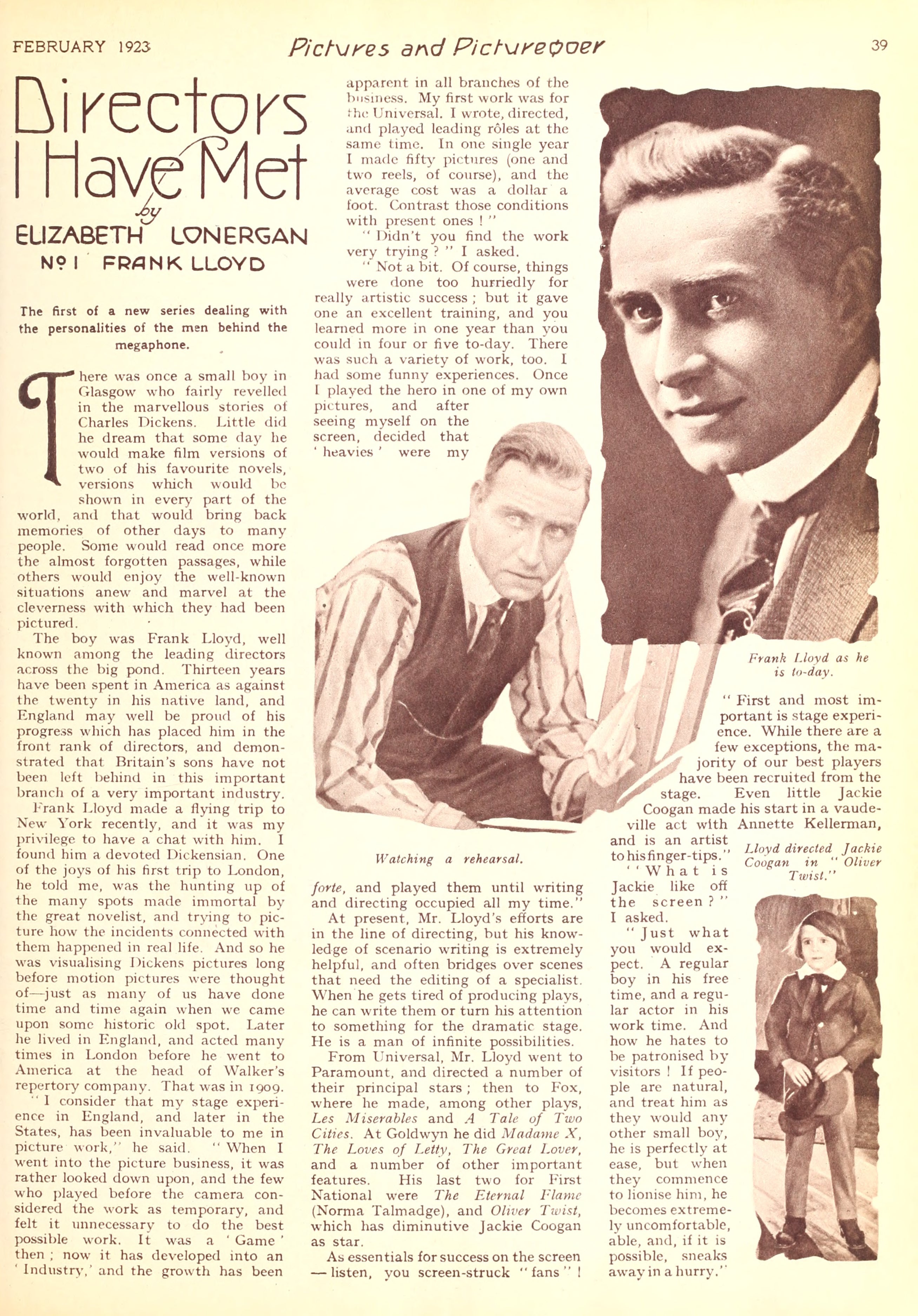Frank Lloyd — Directors I Have Met (1923) 🇬🇧

There was once a small boy in Glasgow who fairly revelled in the marvellous stories of Charles Dickens. Little did he dream that some day he would make film versions of two of his favourite novels, versions which would be shown in every part of the world, and that would bring back memories of other days to many people. Some would read once more the almost forgotten passages, while others would enjoy the well-known situations anew and marvel at the cleverness with which they had been pictured.
by Elizabeth Lonergan
The boy was Frank Lloyd, well known among the leading directors across the big pond. Thirteen years have been spent in America as against the twenty in his native land, and England may well be proud of his progress which has placed him in the front rank of directors, and demonstrated that Britain’s sons have not been left behind in this important branch of a very important industry. Frank Lloyd made a flying trip to New “York recently, and it was my privilege to have a chat with him. I found him a devoted Dickensian. One of the joys of his first trip to London, he told me, was the hunting up of the many spots made immortal by the great novelist, and trying to picture how the incidents connected with them happened in real life. And so he was visualising Dickens pictures long before motion pictures were thought of — just as many of us have done time and time again when we came upon some historic old spot. Later he lived in England, and acted many times in London before he went to America at the head of Walker’s repertory company. That was in 1909.
“I consider that my stage experience in England, and later in the States, has been invaluable to me in picture work,” he said, “When I went into the picture business, it was rather looked down upon, and the few who played before the camera considered the work as temporary, and felt it unnecessary to do the best possible work. It was a ‘Game’ then; now it has developed into an ‘Industry,’ and the growth has been apparent in all branches of the business. My first work was for the Universal. I wrote, directed, and played leading roles at the same time. In one single year I made fifty pictures (one and two reels, of course), and the average cost was a dollar a foot. Contrast those conditions with present ones!”
“Didn’t you find the work very trying?” I asked.
“Not a bit. Of course, things were done too hurriedly for really artistic success; but it gave one an excellent training, and you learned more in one year than you could in four or five to-day. There was such a variety of work, too. I had some funny experiences. Once I played the hero in one of my own pictures, and after seeing myself on the screen, decided that. ‘heavies’ were my forte, and I played them until writing and directing occupied all my time.”
At present, Mr. Lloyd’s efforts are in the line of directing, but his knowledge of scenario writing is extremely helpful, and often bridges over scenes that need the editing of a specialist. When he gets tired of producing plays, he can write them or turn his attention to something for the dramatic stage. He is a man of infinite possibilities.
From Universal, Mr. Lloyd went to Paramount, and directed a number of their principal stars; then to Fox, where he made, among other plays, “Les Misérables” and “A Tale of Two Cities.” At Goldwyn he did “Madame X,” “The Loves of Letty,” “The Great Lover,” and a number of other important features. His last two for First National were The Eternal Flame (Norma Talmadge), and “Oliver Twist,” which has diminutive Jackie Coogan as star.
As essentials for success on the screen — listen, you screen-struck “fans”!
“First and most important is stage experience. While there are a few exceptions, the majority of our best players have been recruited from the stage. Even little Jackie Coogan made his start in a vaudeville act with Annette Kellerman, and is an artist to his fingertips.
“What is Jackie like off the screen?” I asked.
“Just what you would expect. A regular boy in his free time, and a regular actor in his work time. And how he hates to be patronised by visitors! If people are natural, and treat him as they would any other small boy, he is perfectly at ease, but when they commence to lionise him, he becomes extremely uncomfortable, able, and, if it is possible, sneaks away in a hurry.”

Watching a rehearsal.
Frank Lloyd as he is to-day.
Lloyd directed Jackie Coogan in “Oliver Twist.”
Collection: Picturegoer Magazine, February 1923
---
see also other entries of the Directors I Have Met series:
- 1923-02: Frank Lloyd
- 1923-03: Allan Dwan
- 1923-04: Rex Ingram
- 1923-05: Frederic Sullivan-Londoner
- 1923-06: James Cruze
- 1923-07: John Robertson
- 1923-08: J. Gordon Edwards
- 1923-09: Elmer Clifton
- 1923-11: Herbert Brenon
- 1924-01: Harold Shaw
- 1924-06: Al Christie
- 1924-11: Millard Webb
- 1925-11: John Francis Dillon
